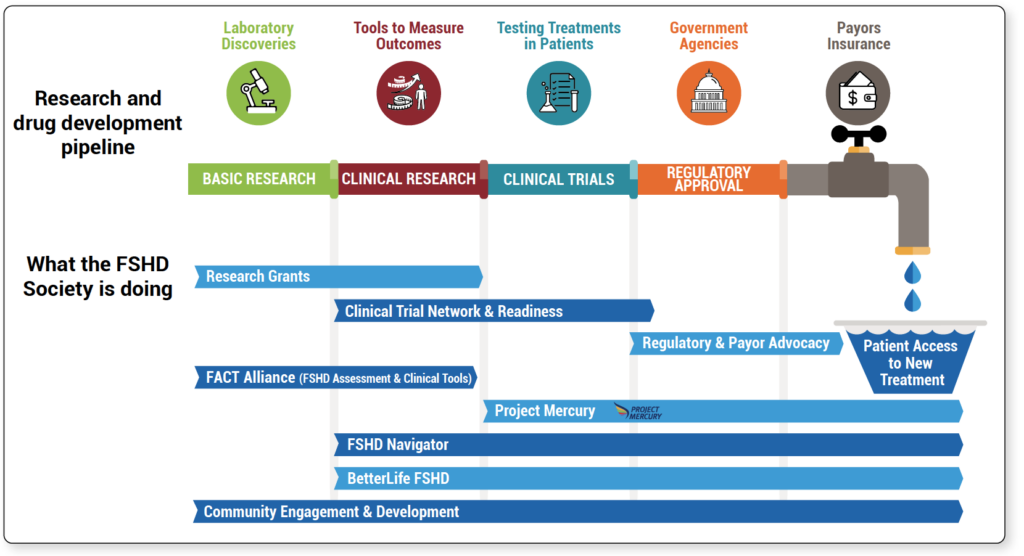What the FSHD Society can and must do for the community
by June Kinoshita, FSHD Society
The FSHD Society has been tightly focused on understanding FSHD and speeding up the development of treatments. Now that we are in the 12-month home stretch for the first-ever Phase 3 trial of a drug designed to slow the disease process, it’s time to look up and scan the horizon. We all desperately want better medicines, but our ultimate goal is better lives for everyone with FSHD.
A better life means different things to different people. The challenges that arise from living with FSHD are many, and we are continually thinking about how to address them. From the outside, our efforts may seem fragmented, but our diverse activities are part of a coherent strategy. This diagram is an attempt to explain how the parts fit together. It’s a lot to digest, but bear with me.

Across the top is the drug development pipeline, the process that all drugs go through to reach patients. Below the pipeline in blue are our initiatives. As drug candidates advanced through the pipeline, we have anticipated the next steps. In 2016, we began investing in the Clinical Research Trial Network. In 2020, we provided patient testimony to the FDA. This year, we launched the FACT Alliance to promote collaboration to build better tools for clinical trials.
With multiple clinical trials coming, we must increase the pool of eligible patients. And when new drugs are approved, we must advocate for patients to have access to them. Project Mercury is working toward these aims by engaging companies, researchers, and experts in regulatory and insurance matters.
Our two newest initiatives are centered on health and well-being. BetterLife FSHD will provide a tool for people to track their health, receive useful tips, and share data to improve future clinical trials. FSHD Navigator is a service to help people find their way to solutions for their FSHD-related challenges, including getting into research studies and clinical trials. We’ll be launching them in 2024.
Undergirding all of this are our community development programs – the local chapters, 360 conferences, events, Zoom groups – all the ways that we are here to support you on your journey so that you can live your best life.


Hi, our daughter at 14 years old was just diagnosed with FSHD type 1. She is active and physically strong but has certain weakness and fatigue. Her current peds neurologist is not specialized in FSHD. We would like to be active in her care now versus a wait and see approach, or just treating symptoms. We want to use whatever therapy available to her to retain upcoming muscle growth. Can you provide information for us to get with the best care team? We live in IL but are open to explore care wherever.
Hello, this would be a great question for our FSHD Navigators. You can find more information about the Navigator program and how to contact them on this page: https://www.fshdsociety.org/for-patients-families/fshd-navigator/